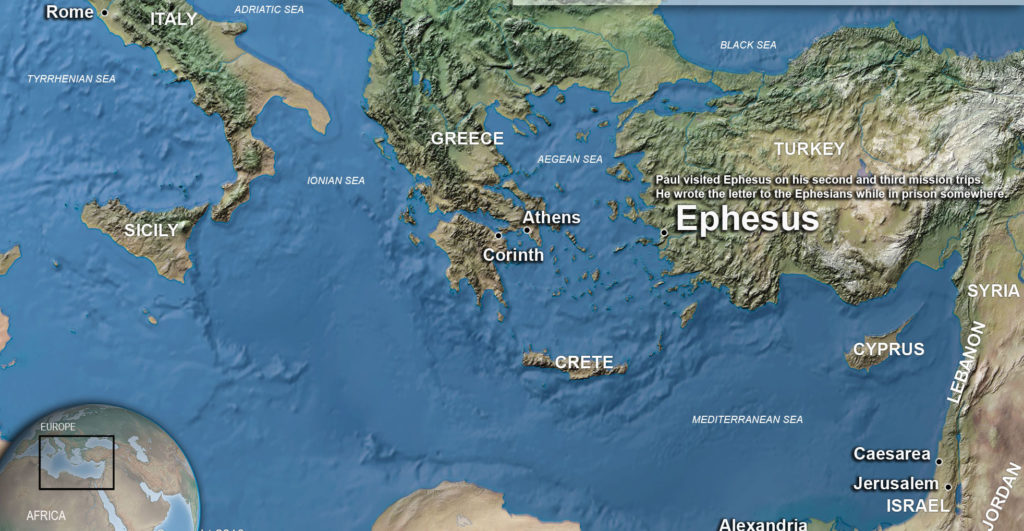In the first century, when the apostle Saul/ Paul 1 traveled to Ephesus (now in modern-day Turkey), a city with a long and illustrious history. Dating back to the Greek migrations of 1200 BC, Ephesus underwent several rebirths. In Greek times, it was the birth place of a great pre-Socratic philosopher named Heraclitus. It was considered an important center of learning and culture. The streets at night were illuminated by oil lamps, which was a rare luxury in ancient cities. In Roman times, the city was a major center of cultural exchange. The ancient historian Aristio described Ephesus as being the most important trading center in the Roman province of “Asia.”
The city was also world famous for its massive temple dedicated to the Greek goddess Artemis (or Diana to the Romans), who was goddess of chastity but also fertility and childbirth. The Temple of Artemis in Ephesus was one of the “Seven Wonders” of the ancient world and there was a legend that the statue of the goddess was a gift from the gods that fell out of the sky. This was likely based on a meteor that fell at some point in city’s past. It was almost double the size of the Parthenon in Athens. Pliny the Elder, a Roman official and historian, called the temple of Artemis, “the most wonderful monument of Grecian magnificence.” The priests of the temple of Artemis were all women who “ruled the show and kept the men in their place.” This becomes a crucial piece of context for a highly controversial passage in First Timothy, which is also set in Ephesus (i.e. I Tim. 2.11-12).
“Now, if you were writing a letter to someone in a small, new religious movement with a base in Ephesus, and you wanted to say that because of the gospel of Jesus the old ways of organizing male and female roles had to be rethought from top to bottom, with one feature being that women were to be encouraged to study and learn and take a leadership role, you might well want to avoid giving the wrong impression. Was the apostle saying, people might wonder, that women should be trained so that Christianity would gradually become a cult like that of Artemis, where women led and kept the men in line? That, it seems to me, is what verse 12 is denying. The word I’ve translated as ‘try to dictate to them’ is unusual but has overtones of ‘being bossy’ or ‘seizing control.’ Paul is saying, like Jesus in Luke 10, that women must have the space and leisure to study and learn in their own way, not in order that they may muscle in and take over the leadership as in the Artemis cult, but so that men and women alike can develop whatever gifts of learning, teaching, and leadership God has given them.” 2
- Saul of Tarsus sometimes went by “Paul” when he was ministering in predominantly Gentile settings, but never ceased to 1 be “Saul.” Like many people today, he had two names. He was Saul in his native language and culture, and he had a second name for when he interacted with majority culture peoples. His name was not changed by God, nor was it changed after he submitted himself to the Lordship of Jesus as Messiah.
- N. T. Wright, Surprised by Scripture: Engaging Contemporary Issues (HarperOne, 2015), p.80-81.




